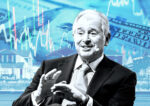Trending
The “worst is over”: Fed’s planned rate cuts boost confidence for South Florida real estate
Brokers are giddy over the Fed’s announcement, while some caution fundamental challenges remain

Commercial broker Jaret Turkell is ready to rock and roll.
Turkell posted a GIF of Minions dancing with the tagline: “It’s time to PARTYYYYYY!” shortly after Federal Reserve Chairman Jerome Powell announced on Wednesday that the Fed was keeping interest rates unchanged, and signaled it would make three 0.25 percentage point rate cuts next year.
“We are back baby. LFG!!!!!!” reads another tweet from Turkell, who focuses on multifamily and investment land sales at Berkadia in South Florida. (LFG stands for “let’s f**king go.”)
“The sentiment changed almost overnight,” Turkell said, tempering his initial enthusiasm a bit. “I’m not saying we’re back to 2021. Valuations will start to get a bit more attainable.”
“Massive distress is going to be somewhat off the table, at least I hope so,” he added.
The Fed’s decision is expected to boost confidence across commercial and residential real estate, especially in South Florida. The region has been somewhat insulated from headwinds in other U.S. markets since the Fed began hiking rates in the spring of 2022, but investment sales volume is way down.
More than anything, the expected cuts are a sign of improving — not worsening — conditions. That could result in a boost of sales and financing in the second half of next year, brokers and attorneys say.
“Real estate is not a liquid asset, and it takes time for things to change. It takes time for that sentiment to build into transactions,” said Charles Foschini, senior managing director at Berkadia.
Still, the planned rate cuts won’t solve all problems, experts say.
The high cost of insurance and construction will continue to hamper deals, brokers say. While South Florida maintains advantages over other major metros in the U.S., its biggest downside is insurance, Foschini said.
Eternal optimism meets reality
Some pointed to the stock market rallying this week and the drop in inflation as breadcrumbs indicating that more good news is on the way.
“The signal that rates have stopped going higher and will go lower, psychologically is very impactful,” said industrial developer and broker Ed Easton. But it’s “not earth-shattering,” he added.
In fact, most expected Powell would leave rates unchanged.
“No one was anticipating anything more than a standstill at this time of year,” said commercial broker and developer Stephen Bittel, chairman of Terranova Corp. The expected cuts are “not an enormously meaningful adjustment, but it does telegraph future expectations.”
Jaime Sturgis, CEO of Fort Lauderdale-based Native Realty, said he is already seeing that confidence translate into better terms. “That will continue next year,” he added.
Still, asset classes like office and multifamily could suffer disproportionately, especially as suburban office tenants continue to downsize and multifamily landlords struggle to turn a profit.
“There will be pain and distress in that market, no question about it,” Sturgis said.
Some multifamily landlords and developers “were already operating on razor thin margins to begin with,” Sturgis adds. “The smallest variations in that model can break it.”
Multifamily developer Asi Cymbal, who has projects in Miami Gardens, Fort Lauderdale and Dania Beach, agreed that rate cuts won’t solve major problems, such as if a developer overpaid for land.
But, he said, “the worst is over.”
Cymbal and others expect more groundbreakings in 2024, with some self-funding initial construction, expecting that they can secure a loan. He plans to self-fund the groundbreaking of Nautico, a $1.5 billion mixed-use development fronting Fort Lauderdale’s New River, in the next 90 days.
The Fed news could help “top tier” developers get lower rates on construction. But not most, he said. “Lenders will continue to be conservative,” Cymbal said.
Bilzin Sumberg partner Joe Hernandez said some prospective buyers who were ready to purchase may postpone their decision until rate cuts happen.
“It may be a bad thing for transactional volume right now, but good later on,” Hernandez said.
2023 context
The series of rate hikes “put a freeze on everything,” said Sturgis of Native Realty. “2023 was a tough year for deal flow and investment sales.”
A “tremendous” amount of cash earmarked for distress has been sitting on the sidelines. Sturgis and others hope for the “soft landing” that’s being talked about, but no one really knows how severe it could be.
“Maybe some of that capital comes back into the market in more of a traditional fashion,” Sturgis said.
Real estate attorney Bill Kramer, of the Fort Lauderdale law firm Brinkley Morgan, expects deal volume to rise because of all the money waiting to be deployed.
“There should be more money taken out of cash and put into real estate,” he said.
Saul Ewing LLP attorney and partner Anthony Kang said anyone with a loan coming due in the spring is probably already speaking with their lenders, but there is no certainty yet of the Fed’s timing.
“When the rate actually does drop, I suppose it will be helpful,” Kang said. “In the meantime I think people are still cautious about what is going to happen next year.”
Kang said it may be true that the market has bottomed out, but pointed to the many loans maturing in the next 18 months.
“Some might even argue we haven’t even seen the impact of the high rates,” he said. “Even though the market has slowed, it’s not like we saw any mass foreclosures or anything happening.”
Ben Jacobson, a partner at Forman Capital, said the market is “overreacting a little bit to the rate cuts.”
“On the surface it’s good news. I don’t think it’s a savior for most issues. We have a lot of problems, especially in Florida,” he said. “I see trouble in credit, broken capital structures, borrowers that can no longer hang on. There are challenges that haven’t worked their way through the system.”
Jacobson also mentioned South Florida’s infrastructure issues, referring to pressures on the water, sewer and waste management systems that have intensified due to recent population growth.
“Everything is happening so quickly,” he said. “It’s like in a cartoon if someone dropped from the sky a fully built house, and they haven’t had a chance to [get inside] the house.”
Resi rebound
Increased confidence will extend to home sellers and buyers, residential brokers say. Annual sales have been on the decline for more than a year, and price growth has been slowing. Yet, residential sales continue to set records across the region.
“People have been delaying life decisions based on inflation and interest rates,” said Jeff Polashuk, regional vice president at Compass. “This is going to give consumers the ability to have a lower rate, which will bring costs down, which will bring more people back to the table for homes.”
Polashuk said that was top of mind on Thursday morning during Compass’ “principal mastermind call” with about 100 Florida agents, who were urged to “use this as an opportunity to educate buyers and sellers.”
Compass also plans to bring in a mortgage expert next week to explain how the rate cuts will affect buying power. Banks are already offering lower rates, Polashuk said.
Craig Studnicky, CEO of the brokerages ISG World and Related ISG, expects the migration of buyers from other states to continue.
“You’re going to see a spike in inventory and sales,” Studnicky said, pointing to what he calls “the biggest pent-up demand of buyers” waiting to purchase. “Expect prices to go up next year.”
Calixto Garcia-Velez, president and CEO of Banesco, also expects more buyers to enter the marketplace. Banesco has continued to lend throughout 2023, unlike many of its peers. “Our pipeline is very full, and we’re being very selective,” he added.
“We’re hoping this will put some life in the real estate market, residential as well as commercial,” Garcia-Velez said. “There are many projects that don’t pencil out anymore at the very high rates.”




